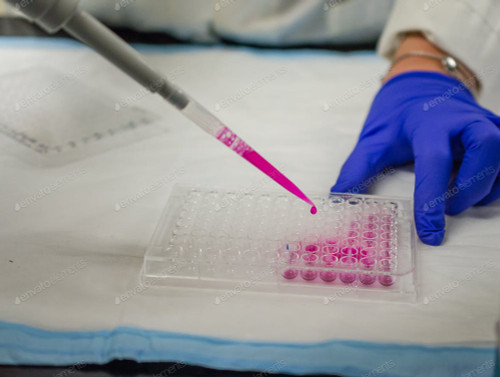Product Description
Recombinant Human Programmed cell death 1 ligand 1 (CD274), partial (Active) is available at Gentaur for Next week Delivery.
Gene Name: CD274
Alternative Names : PD-L1 (PDCD1 ligand 1) (Programmed death ligand 1) (hPD-L1) (B7 homolog 1) (B7-H1) (CD274)
Expression Region : 19-238aa
AA Sequence : FTVTVPKDLYVVEYGSNMTIECKFPVEKQLDLAALIVYWEMEDKNIIQFVHGEEDLKVQHSSYRQRARLLKDQLSLGNAALQITDVKLQDAGVYRCMISYGGADYKRITVKVNAPYNKINQRILVVDPVTSEHELTCQAEGYPKAEVIWTSSDHQVLSGKTTTTNSKREEKLFNVTSTLRINTTTNEIFYCTFRRLDPEENHTAELVIPELPLAHPPNER
Sequence Info : Partial
Tag Info : C-terminal FC-tagged
Theoretical MW : 52.7 kDa
Storage Buffer : Lyophilized from a 0.2 ?m filtered PBS, 6% Trehalose, pH 7.4
Endotoxin Level : Less than 1.0 EU/ug as determined by LAL method.-
Biological Activity : Measured by its binding ability in a functional ELISA. Immobilized PD-L1 at 2 ?g/ml can bind Anti- PD-L1 mouse monoclonal antibody(CSB-MA878942A1m?antigen from E.coli), the EC50 of human PD-L1 protein is 1.252-1.653 ng/mL.
Storage : Short term: -20°C; Long term: -80°C. Minimize freeze and thaw cycles.
Research Area : Cancer
Restriction : For Research Use Only. Not for use in diagnostic procedures, drug use, or for administration to humans or animals.
Relevance : Plays a critical role in induction and maintenance of immune tolerance to self (PubMed:11015443, PubMed:28813417, PubMed:28813410). As a ligand for the inhibitory receptor PDCD1/PD-1, modulates the activation threshold of T-cells and limits T-cell effector response (PubMed:11015443, PubMed:28813417, PubMed:28813410). Through a yet unknown activating receptor, may costimulate T-cell subsets that predominantly produce interleukin-10 (IL10) (PubMed:10581077) The PDCD1-mediated inhibitory pathway is exploited by tumors to attenuate anti-tumor immunity and escape destruction by the immune system, thereby facilitating tumor survival (PubMed:28813417, PubMed:28813410). The interaction with PDCD1/PD-1 inhibits cytotoxic T lymphocytes (CTLs) effector function (By similarity). The blockage of the PDCD1-mediated pathway results in the reversal of the exhausted T-cell phenotype and the normalization of the anti-tumor response, providing a rationale for cancer immunotherapy (By similarity).
Function :
Involvement in disease :
Subcellular location :
Protein Families :
Tissue Specificity :
Paythway :
Uniprot ID : Q9NZQ7
 Euro
Euro
 British Pound
British Pound
 US Dollar
US Dollar








